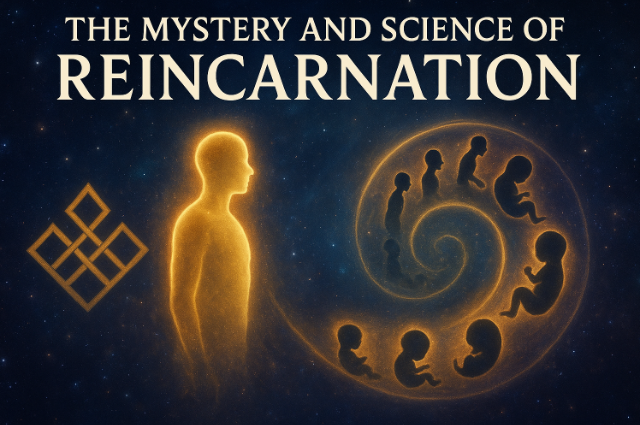
Reincarnation
The term reincarnation refers to the meaning of rebirth or transmigration, which defines a new life span with a new birth in a different form of the body, after biological death. The word reincarnation derives from a Latin term that means the flesh born again. Reincarnation refers to the belief that an aspect of every human being continues to exist after death. This aspect may be the soul, mind, consciousness, or something transcendent which is reborn in an interconnected cycle of existence, the transmigration, belief varies by culture and is envisioned to be in a form of a newly born human being, animal, plant, spirit, or as being in some non-human realm of existence.
Reincarnation – An Aspect of Religion
However, reincarnation happens on the basis of the human soul’s past life meritocracy. Rebirth is a key concept found in major Indian religions, and is discussed using various terms punarjanmam, in the ancient Sanskrit texts of Hinduism, Buddhism, and Jainism. These religions believe that reincarnation is cyclic and endless, until one gains spiritual insights that end the cycle, leading to liberation. They consider the release from the cycle of reincarnation as the ultimate spiritual goal and call the liberation by terms such as moksha, nirvana, Mukti, and kaivalya.
The idea of reincarnation did exist in the early Vedic religions. The early Vedas mention the doctrine of karma and rebirth. The earliest layers of Vedic text incorporate the concept of life, followed by an afterlife in heaven and hell based on cumulative virtues (merit) or vices (demerit)
Karma Related to Reincarnation
Karma is a significant factor that plays a major role in the reincarnation process. The karma that was created in a person’s life, as well as in their past lives, will affect the complexity, experience, trajectory, and duration of the soul’s reincarnation.
For example, one who was the reason for the act of barbarism and caused the death of innocent lives, reincarnation will be different compared to the person who is a normal vegetable seller. Because their karma will be different according to the nature of their lives. Karma is another concept that is widely misunderstood in Western society. It is often reduced to meaningless slogans about creating good karma or just being a nice person. But in eastern traditions, karma is recognised as a fundamental law of the universe. Every modern Newtonian law recognizes that every action has an opposite reaction. The law of karma refers to the same thing. This is why karma is also called the law of cause and effect. However, it recognizes that any physical, emotional, hygienic, energetic, mental, spiritual, or other personal or universal actions and reactions are all governed by the law of karma. When it comes to reincarnation, karma influences what happens to each soul. But the soul’s process is not inherently good or bad; it’s simply what needs to happen based on universal laws.
Concept and Purpose of Reincarnation
The divine consciousness creates reflections of itself, or restricts its awareness, so that it experiences multiplicity and individuality.
Reincarnation is a fundamental part of soul evolution because it allows a soul to progress from lower forms of life to higher ones and eventually, to achieve full self-realisation. Reincarnation is the soul’s journey of remembering, refining, and returning to its true self.
Memories of Past Lives
Psychiatrist Ian Stevenson from the University of Virginia recorded case studies of young children who claimed to remember past lives. In his cases, he reported the child’s statements and testimony from family members and others, often along with what he considered to be correlates to a deceased person who in some ways seemed to be match the child’s memory Stevenson also investigated cases where he thought that birthmarks and birth defects seemed to match the wounds and scars on the deceased.
Real examples Related to Reincarnation
Around the world, there are many anecdotal examples, one well known example is James leininger, a child born in the United States in the 1990s, who had memories that seemed to be from past life as WWII fighter pilot, he told his parents many details about his past life,
such as the name of the aircraft carrier he had worked on and the names of the other pilots and people he had known. Many of these details were proven to be right, and the young boy even went to meet some of his previous incarnation’s friends from the war.
Shanti Devi
She was born on 11 December 1926, also known as Lugdi Devi. As a young girl, she began to claim that she remembered details of a past life. She was four years old, and she told her parents that her real home was in Mathura, where her husband lived, about 145km from her home in Delhi. She once attempted to reach Mathura. She spoke to her teacher and headmaster, she used words from the Mathura dialect, and divulged the name of her merchant husband, Kedarnath Chaubey. This case was brought to the attention of Mahatma Gandhi, who set up a commission to investigate.
Could 4 year 4-year-old girl be the Kalpana Chawla?
Four-year-old Upasana has begun to draw huge crowds to Nar Mohammadpur village in Bulandshahr district of western Uttar Pradesh, where everyone tends to believe that she could be a reincarnation of Chawla, who perished in the Columbia disaster exactly four years ago. The little girl who fears the very sight of aircraft had been telling her illiterate parents that she had died in a crash up in the skies. Upasana was born barely two months after Kalpana died in the space disaster.
. . .
References:
